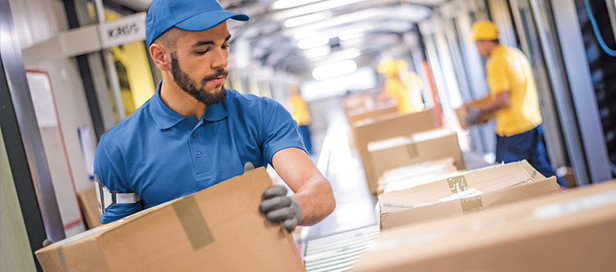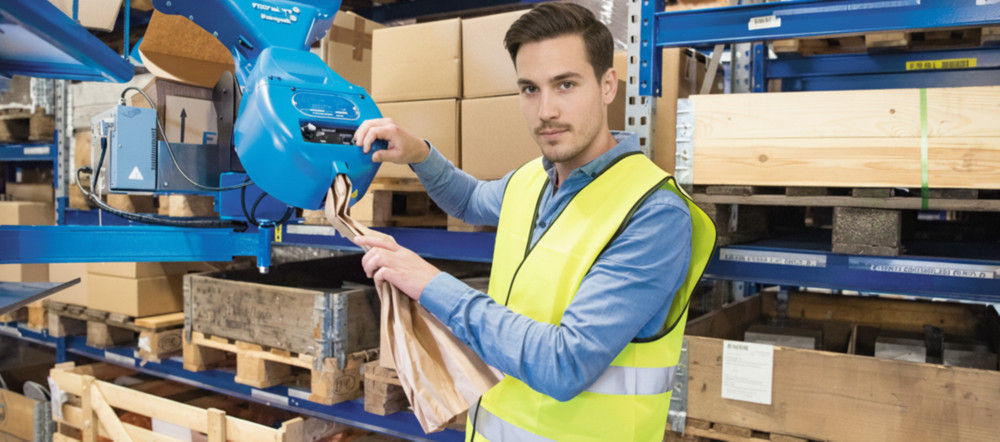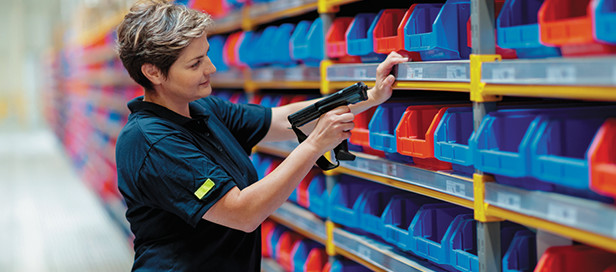Conveyors
Streamlining Material Handling
Conveyors are a fundamental component of material handling equipment used across industries in the UK. They play a crucial role in automating processes, improving efficiency, reducing manual handling, and optimising workflow in industrial settings. They can be integrated into larger systems or used as standalone units to facilitate the smooth and continuous movement of goods or materials throughout a facility.
At RAJA UK we offer standard and flexible gravity conveyors featuring rollers crafted from either PVC or Zinc. Available in various sizes with a range of additional accessories such as side guides, end stops, and height-adjustable stands, you can tailor a conveyor system perfectly suited to your business needs.
What is a Gravity Conveyor?
Conveyors are a fundamental component of material handling equipment used across industries in the UK. It serves the purpose of effortlessly moving items or products along a conveyor line either manually or by leveraging the force of gravity. Unlike powered roller conveyors, which necessitate external power sources like motors or electricity to operate, gravity roller conveyors harness the innate force of gravity to facilitate the seamless movement of items along the conveyor path.
Businesses operating within various sectors in the UK, seeking efficient means to transport items or materials within their facilities or along production lines, can find significant advantages in adopting gravity roller conveyors. These conveyors not only enhance materials handling but also contribute to improved productivity and streamlined workflow across diverse industries.
What is a Flexible Conveyor?
A flexible conveyor, also known as an expandable conveyor or accordion conveyor is designed to adapt to various needs and spaces within a warehouse, distribution centre, or manufacturing facility. Unlike our standard rigid conveyors, flexible conveyors can expand and contract, allowing for easy adjustment of length and shape to suit specific requirements.
They are often used for loading and unloading trucks, moving products between different areas of a facility, or for temporary conveyor setups in dynamic work environments. Flexible conveyors offer versatility, ease of installation, and can be quickly reconfigured to accommodate changing workflow needs.
PVC or Zinc Rollers?
Gravity roller conveyors are characterised by parallel rollers evenly spaced along the conveyor frame. The choice between PVC and Zinc rollers hinges on several factors including load capacities, specific application requirements, and environmental conditions. Each roller type offers distinct characteristics and advantages:
PVC Rollers:
- PVC rollers are crafted from polyvinyl chloride, a resilient plastic material renowned for its durability.
- The lightweight nature of PVC rollers facilitates easy handling and installation.
- Corrosion-resistant properties make PVC rollers suitable for environments susceptible to moisture or chemical exposure.
- Smooth and quiet operation of PVC rollers reduces noise levels in the workspace.
- However, PVC rollers may have limitations concerning load capacity and longevity compared to their metal counterparts.
Zinc Rollers:
- Zinc rollers are fabricated from steel coated with a layer of zinc, offering superior corrosion resistance.
- Enhanced strength and durability render Zinc rollers ideal for heavier loads and more demanding applications.
- Longer lifespan and resilience enable Zinc rollers to withstand harsh environmental conditions.
- Despite their advantages, Zinc rollers may be heavier than PVC rollers, necessitating more effort during installation and maintenance.
- Zinc rollers excel in applications prioritising durability and load capacity.
What Businesses Can Benefit from a Conveyor:
Businesses spanning various industries in the UK stand to gain from integrating gravity roller conveyors into their operations.
Warehousing and Distribution Centres:
Gravity roller conveyors streamline tasks such as order picking, sorting, and movement of goods between storage areas and shipping docks, enhancing operational efficiency within warehouses and distribution centres.
Manufacturing:
Manufacturers leverage gravity roller conveyors to transport raw materials, work-in-progress items, or finished products between different stages of the production process, thereby optimising workflow and productivity on the production floor.
Retail:
Retail establishments utilise gravity roller conveyors for receiving merchandise, replenishing stock on store shelves, and fulfilling customer orders, facilitating seamless handling and movement of goods within the retail environment.
Logistics and Transportation:
Companies engaged in logistics, transportation, and supply chain management employ gravity roller conveyors for loading and unloading cargo at distribution hubs, ports, and freight terminals, ensuring efficient movement of goods.
Food and Beverage:
Food processing facilities, breweries, and beverage manufacturers rely on gravity roller conveyors to convey bottles, cans, crates, or packaging materials along the production line while adhering to stringent hygiene standards.
E-commerce and Fulfilment Centres:
With the surge in e-commerce, fulfilment centres and online retailers harness gravity roller conveyors for order fulfilment, sorting, and packaging operations, facilitating efficient management of product flow to meet customer demands.
- Workplace Equipment
-
Length mm
-
Colour













